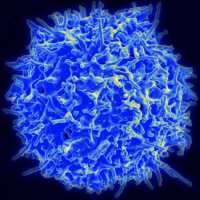The Cancer Survivors Network (CSN) is a peer support community for cancer patients, survivors, caregivers, families, and friends! CSN is a safe place to connect with others who share your interests and experiences.
Hepatosplenic T-Cell Lymphoma
My younger brother was just diagnosed with Hepatosplenic T-Cell Lymphoma. This is likely attributed to some meds he was taking for Crones. We want to talk to people who are fighting the same disease or family members of those who have it.
His is the alpha-beta type, which we are told is "more treatable", however, we don't know what this means in light of reports that this is a very aggressive, deadly form of the disease. All reports that I have read say 6-12 months is the average survival rate. We need more information and are understandable very upset.
Comments
-
A specialist is needed
Very sorry to hear this. All T-Cell Lymphomas are rare. HSTCL is extremely rare. Finding others with the same condition might be very difficult, and narrowing it further to your brother's age range may be near impossible. Having fought two T-Cell Lymphomas, I can confidently tell you that you brother needs to consult with one of the few T-Cell Lymphoma specialists that exist. The disease is so rare and aggressive that virtually no oncologists and very few hematologists will have any experience with it.
If you are in the states, an ASAP consultation with a T-Cell specialist at one of the various National Cancer Institute designated comprehensove cancer centers is very strongly urged. If in Canada, there is an acknowledged T-Cell specialist at the British Columbia Cancer Agency. If in Australia, there is also a well-regarded specialist there.
-
An explanation of HSTCL
-
-
Extremely rare variation
However, all systemic T-Cell Lymphomas are rare and aggressive. There is no standard therapy for any of the systemic varieties of this lymphoma. First recommendation is a clinical trial, if 1) there happens to be one open and 2) your treatment center offers that specific trial. As you may have found, prognosis is uniformly poor, but that is only from a statistical standpoint. Someone survives every type of cancer, so we must decide to be in that group.
For that reason, I cannot stress the need of a T-Cell Lymphoma speciaist highly enough. Do you know which type of drugs your step-son is receiving? My advice would be to ask about plans B, C and D if plan A is ineffective. Essentially, it boils down to the fact that immediate response must be seen to the treatment or treatment should be stopped and a different regimen tried. The aggressivnsss of the disease does not allow a lot of time for error.
If you are in the US, and not at a National Cancer Institiuve designated comprehensive cancer center, I strongly urge you to have his patholgy and his case report reviewed by a T-Cell specialist at one of these select facilities. Here is a partial listing which represents the most well-known facilities and hematologists who treat T-Cell Lymphomas: http://www.tcllfoundation.org/resources-and-support/treatment-centers
You will notice that there is only about one such faciliy for every other state in the US - the disease and its speciailsits are just that rare. Certainly I am hoping for the best in both cases involved in this thread.
Discussion Boards
- All Discussion Boards
- 6 Cancer Survivors Network Information
- 6 Welcome to CSN
- 122.6K Cancer specific
- 2.8K Anal Cancer
- 457 Bladder Cancer
- 312 Bone Cancers
- 1.7K Brain Cancer
- 28.6K Breast Cancer
- 407 Childhood Cancers
- 28K Colorectal Cancer
- 4.6K Esophageal Cancer
- 1.2K Gynecological Cancers (other than ovarian and uterine)
- 13.1K Head and Neck Cancer
- 6.4K Kidney Cancer
- 684 Leukemia
- 804 Liver Cancer
- 4.2K Lung Cancer
- 5.1K Lymphoma (Hodgkin and Non-Hodgkin)
- 242 Multiple Myeloma
- 7.2K Ovarian Cancer
- 70 Pancreatic Cancer
- 493 Peritoneal Cancer
- 5.7K Prostate Cancer
- 1.2K Rare and Other Cancers
- 544 Sarcoma
- 744 Skin Cancer
- 661 Stomach Cancer
- 193 Testicular Cancer
- 1.5K Thyroid Cancer
- 5.9K Uterine/Endometrial Cancer
- 6.4K Lifestyle Discussion Boards
